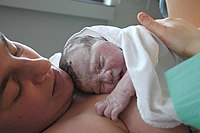
Photo from wikipedia
OBJECTIVES We previously reported that fetal heart rate (FHR) accelerations could be obtained after fetal sound stimulation. We examined FHR accelerations during 20-37 weeks gestational age (GA) in order to… Click to show full abstract
OBJECTIVES We previously reported that fetal heart rate (FHR) accelerations could be obtained after fetal sound stimulation. We examined FHR accelerations during 20-37 weeks gestational age (GA) in order to assess the optimal time for the test. METHODS The fetus was stimulated from the maternal abdomen with pure tone 2000 Hz, 90 dB, 5 s. Changes in the FHR before and after the sound stimulation were measured by a cardiotocometer. RESULTS Compared with the positive rate of FHR accelerations at 20-21 weeks GA, significant increases were recognized in 26-27, 28 to 29, 30 to 31, and 34-35 weeks GA. Comparing the positive rate of FHR accelerations between the minimal and moderate variability of FHR baseline, no significant differences were observed at 20-27 weeks GA. On the other hand, at 28-37 weeks GA, the positive rate to detect FHR accelerations due to sound stimulation was 100% in moderate FHR baseline variability. CONCLUSION Considering development of human fetal hearing, the method should be performed between 28 and 37 weeks GA and during moderate FHR variability corresponding to active sleep conditions. The method developed in the present study may provide a promising tool for evaluating the fetal hearing.
Journal Title: International journal of pediatric otorhinolaryngology
Year Published: 2020
Link to full text (if available)
Share on Social Media: Sign Up to like & get
recommendations!